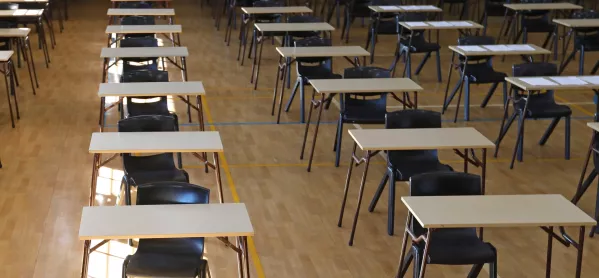
A levels ‘should be replaced with baccalaureate system’

A levels should be scrapped and replaced with a baccalaureate, according to a new report from the EDSK think tank.
The report, Reassessing the future, recommends that A levels, Applied General Qualifications (such as Btecs), T levels and apprenticeships should be combined into a single “baccalaureate” that spans the final years of secondary education.
News: Call to replace GCSEs with ‘Covid-proof’ online tests
Related: State and private schools in ‘movement’ to scrap GCSEs
The case for GCSEs: Abolishing exams at 16 would damage higher education
It argues that A levels “suffer from numerous flaws” and that they have not achieved their stated aim when they were created, which was to avoid students specialising in a narrow range of subjects too early.
Instead, the think tank says that in 2020 just 4.4 per cent of A-level students took more than three subjects, a drop of almost 50 per cent in the past four years alone.
A levels ‘narrow students’ learning’
The report also argues that the lack of breadth in the A-level curriculum makes England “an international outlier”.
The new “Baccalauréat” in France includes six compulsory subjects alongside two or three optional courses, while students in Germany take four or five subjects from a range of disciplines.
And the International Baccalaureate requires students to study up to six subjects, while students taking the most common Leaving Certificate in Ireland usually take seven subjects.
“The absence of compulsory subjects such as English and maths alongside A levels also compares unfavourably with almost all developed countries,” the report adds.
In addition, the report says that the dominance of A levels has a detrimental effect on the prestige of other options for young people, with 83 per cent of students who left school or college last year taking A levels, while courses such as health and social care are increasingly at risk of being squeezed out of the curriculum.
The EDSK report makes the following recommendations:
- A levels, Btecs, T levels and apprenticeships should be replaced by a three-year “baccalaureate” that includes all academic, applied and technical courses.
- The baccalaureate would allow students to gradually specialise in their preferred subjects over the course of the programme, with students also being able to mix-and-match academic, applied and technical courses depending on their interests.
- All students would be required to study English and maths until the age of 18, bringing our secondary education system into line with many other developed nations.
- The baccalaureate would use a single grading system for all courses (Distinction-Merit-Pass-Fail) as well as a single accountability system that measures every student’s progress in the same way, irrespective of their choices.
Tom Richmond, director of EDSK, said: Given that A levels were originally created to prevent students from specialising too early and only studying a narrow range of subjects, it is ironic that this famous qualification brand has never fulfilled this mission and might have made the situation even worse.
“No other developed country would describe studying just three subjects for two years as a ‘gold standard’.
“On the contrary, other major economies typically insist that students take around six to eight subjects in their final years at school or college to ensure they receive a broad and balanced education.
“Previous Conservative and Labour governments have also both recognised that the dominance of A levels has undermined the prestige of applied and technical courses.
“If the current government is serious about boosting technical education, it must end the political obsession with A levels by introducing a ‘baccalaureate’ that creates a level playing field for a broad range of rigorous academic, applied and technical courses.”
Geoff Barton, general secretary of the Association of School and College Leaders, said: “We do need to look again at A levels as part of a wider review of qualifications and the curriculum.
“Whether that means scrapping them is a moot point and there are arguments for and against.
“But what does need to be addressed is the fact that for far too long vocational subjects and qualifications have been perceived as having less worth than academic subjects.
“This has to change, both for the sake of young people and for the sake of an economy which relies on a mix of skills.
“Bringing vocational and academic subjects under the same qualifications banner would be an important step forward in creating a level playing field.
“The fact that the number of subjects taken by students narrows to such an extent between GCSE and A level has not been helped by the current government’s decision to stop AS levels counting towards a full A level.
“Under that system, students typically took four subjects in their first year of post-16 study before specialising in three subjects in their second year, but this was dismantled by the government despite the fact that it preserved greater curriculum breadth and despite the objections of virtually the entire education sector.
“There is, therefore, an undoubted need to address the narrowness and snobbery of our current post-16 qualifications system.”
You need a Tes subscription to read this article
Subscribe now to read this article and get other subscriber-only content:
- Unlimited access to all Tes magazine content
- Exclusive subscriber-only stories
- Award-winning email newsletters
- Unlimited access to all Tes magazine content
- Exclusive subscriber-only stories
- Award-winning email newsletters
You need a subscription to read this article
Subscribe now to read this article and get other subscriber-only content, including:
- Unlimited access to all Tes magazine content
- Exclusive subscriber-only stories
- Award-winning email newsletters
- Unlimited access to all Tes magazine content
- Exclusive subscriber-only stories
- Award-winning email newsletters
topics in this article



